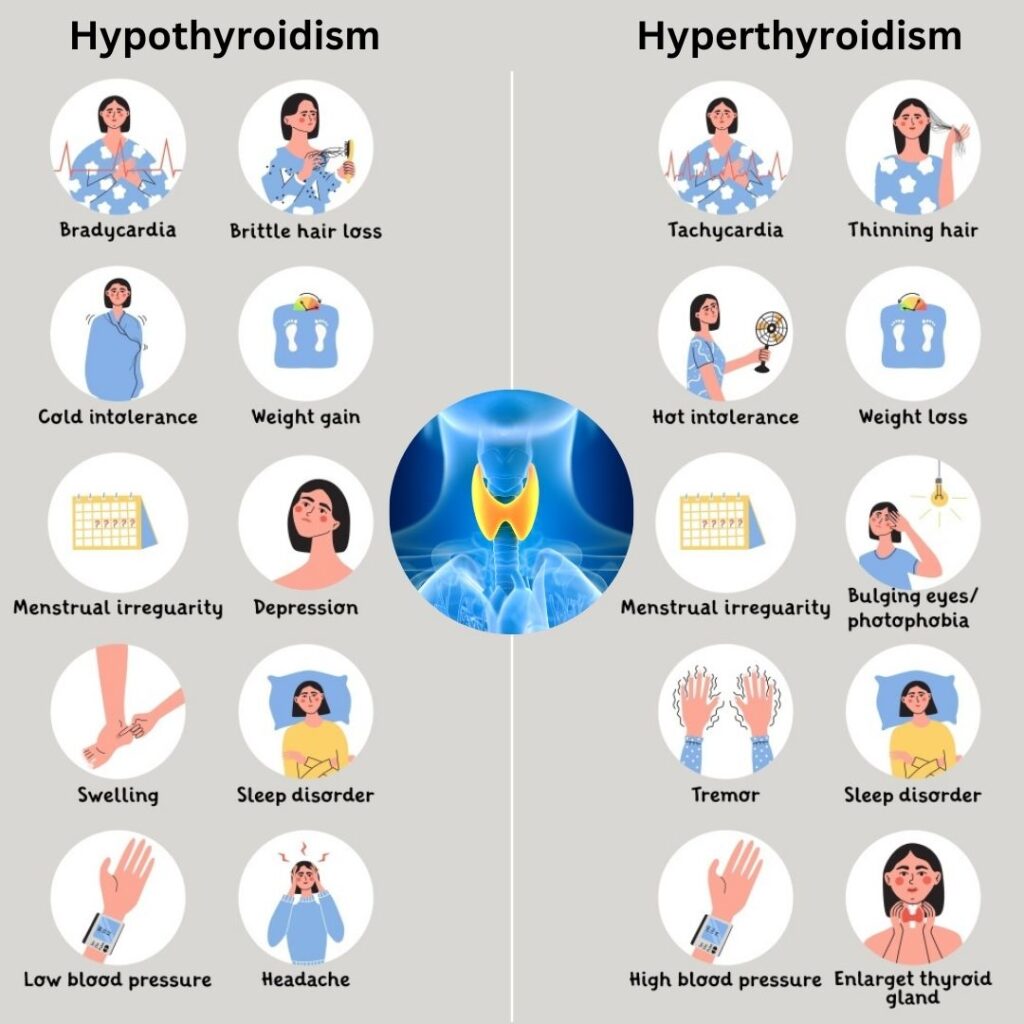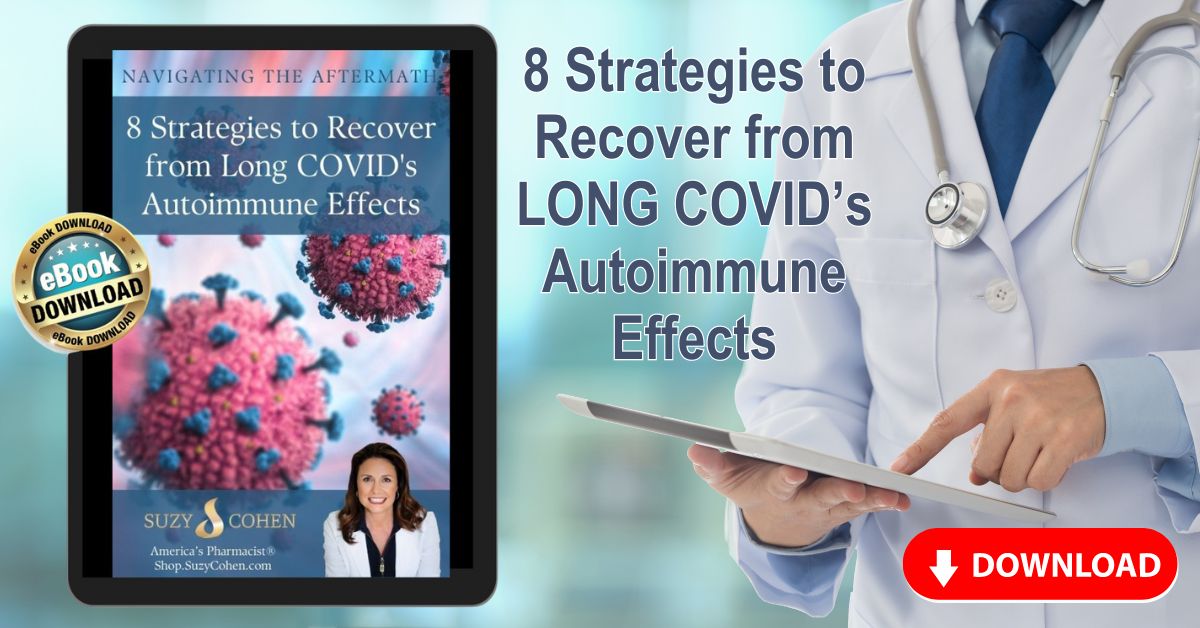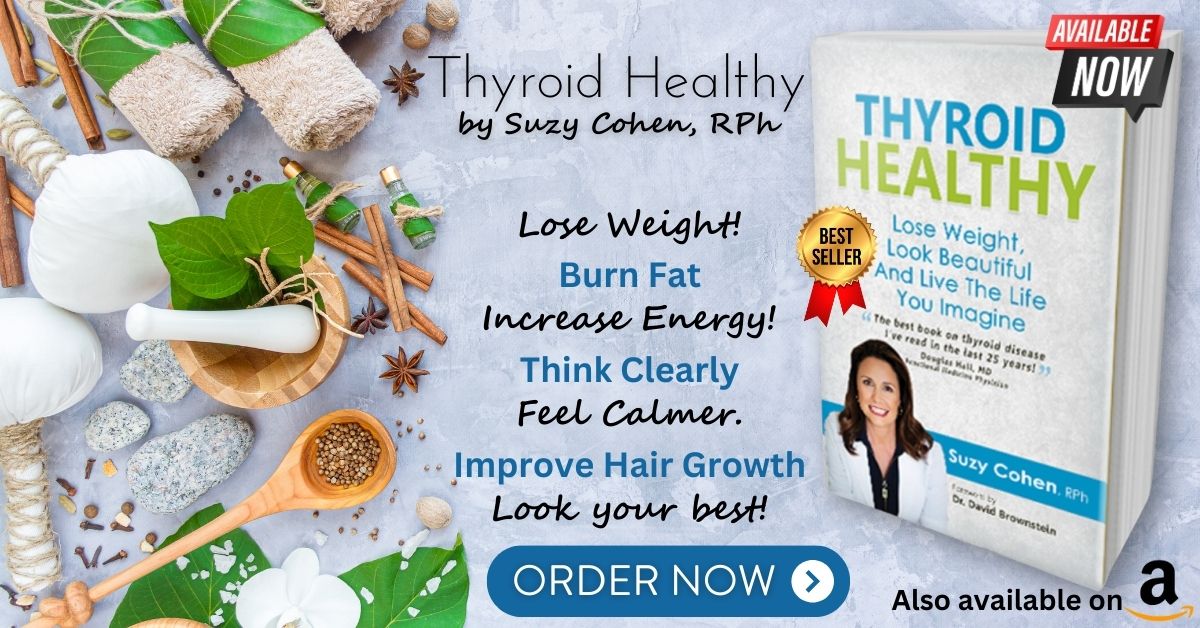What's On This Page?
ToggleHaving a thyroid autoimmune disorder can make you more susceptible to COVID complications and Long COVID.
Think of autoimmune disorders in the same manner you would other immunosuppressive conditions (ie cancer, organ transplantation, history of radiation treatment or chemotherapy).
As it pertains to Hashimoto’s thyroiditis, Graves disease or hypothyroidism you need to be extra vigilant while you’re out in public because your immunity is compromised. Both Hashimoto’s and Graves’ are considered an autoimmune disorder.
The right dose of thyroid medication, and the right kind are critical because you may not be getting enough active thyroid hormone (T3) to your immune system which resides primarily in the intestines. While your body struggles to make do with whatever hormone is available in your body, you may experience symptoms such as poor concentration, chronic fatigue, hair loss, apathy, sensations of being cold, depression and/or anxiety.
Your risk for contracting a cold, the flu or even COVID go up too. This is because your innate immune system depends on having adequate thyroid hormone. And it has to be active thyroid hormone, as in T3. If you have what you think is Long COVID, you may be interested in my new ebook. Click on the graphic below to download it.
Autoimmune Disorders of the Thyroid Gland
If you have autoimmune thyroid disease, or hypothyroidism, your immune system may not be able to protect you from foreign “antigens” or invaders. These include new cancer cells, microorganisms, toxins and even simplistic signals that your body should “see” and don’t due to low thyroid.
If you’re low in thyroid, your protection against invaders is hindered. This means that you’d be more susceptible to complications from a cold or flu, or any viral infection, even Lyme disease which is transmitted by a spirochete.
The mainstay for treating a thyroid autoimmune disorder is medication. Thyroid replenishment drugs available today include Levothyroxine, Synthroid, Levothroid and others. These are the most popular ones, and these are all known as T4 drugs. Your body does need T4, so I don’t want to dismiss the importance of this compound known chemically as thyroxine. Your own gland at the base of your throat produces T4 (thyroxine) as well.
But then what?
The next part is the important part. What happens after you secrete the T4, or take it as a medication in the form of Synthroid for example? The T4 does a little bit of work for you, but then it has to lose an iodine molecule in order to become T3 which is what does the heavy lifting! And after that, the hormones still have to get past your thyroid cell receptors so they can get inside the cell. A lot can happen in between all those steps.
T3 and T4 Requires Tyrosine and Iodine
In case you didn’t realize, that’s what the numbers stand for… iodine molecules. T4 has 4 iodines. T3 has 3. Those iodine molecules are bound to a Tyrosine. A deficiency of either tyrosine or iodine will cause hypothyroidism. If your body doesn’t have all the vitamin and mineral cofactors… like if even one is missing, you cannot drop that iodine to form T3 very well. This is another form of low thyroid disease, something I term “thyroid sick” in my BOOK.
The situation makes you hypothyroid and you could have many, if not all, the symptoms that go with it, especially suppressed immune function, and more frequent colds, fever blisters, rashes and UTIs.
Some doctors prescribe T4 drugs only, as in those mentioned above. Some doctors prescribe T3 drugs only as in compounded T3, or Cytomel (liothyronine).
These drugs are used to treat an under-active or low-functioning thyroid gland (as you see in hypothyroidism). The medications replace insufficient thyroid hormone, secreted by the thyroid gland. Liothyronine is a synthetic form of thyroid hormone that is available by prescription and thought to be more biologically active compared to T4.
 Medications
Medications
Some doctors prescribe both medications to a patient, meaning both T4 drugs and T3, because they know that most people aren’t activating their thyroid hormone.
Many don’t eat well enough these days, or have genetic polymorphisms that hinder activation of thyroid hormone (whether they take medication or they produce it from their gland).
If you can’t do this simple metabolic reaction, you could suffer with symptoms of hypothyroidism even if your thyroid gland is secreting enough.
It’s tough on your physician to get the dosing and the medication correct in a person with Hashi’s or Graves’ because the hormones are swinging sometimes, they go up and down, depending on the day! Sometimes the hour!
This makes it really tough on doctors and patients to get better because it’s like trying to hit a moving target.
Do people with hypothyroidism and Hashimoto’s thyroiditis or Graves’ disease have more complications from COVID?
There isn’t a specific study yet, but yes of course they do. When you have a disease that interferes with normal immune function, and impairs your innate immune system, then you can’t fight quite properly, or you launch a more desperate attack on your own tissue. Recently, I wrote about lactoferrin which is a supplement you can buy (I do not sell this), so if you’d like to learn more about lactoferrin and its role in autoimmune disorders, CLICK HERE.
I think one difficulty is that a person could very well have an autoimmune disorder without even knowing it. Millions of people have conditions they are unaware of. They just deal with very mild symptoms of ‘this and that’ and never visit a doctor, or never get diagnosed.
What If You Have Another Autoimmune Disorder?
What about other autoimmune disorders like rheumatoid, psoriasis, rosacea, lupus and MS? Do people with those conditions have more complications from COVID? More than likely, yes, but it would depend on how mild, or serious their condition is, and how well they are controlled with their regimen.
If you have an autoimmune thyroid disorder like Hashimoto’s thyroiditis or Graves’ disease, you could be more vulnerable to complications from COVID-19. Here are the top three complications to watch out for:
-
Greater Risk of Severe Illness: Autoimmune conditions can throw your immune system out of balance, making it tougher for your body to battle COVID-19. This could lead to more severe symptoms, a higher chance of hospitalization, and complications like pneumonia.
-
Flare-ups of Thyroid Conditions: COVID-19 can trigger a hyperinflammatory response, which might worsen existing autoimmune thyroid issues. If you have Graves’ disease, you could be at risk for a thyroid storm—a dangerous surge of thyroid hormones. On the flip side, if you have Hashimoto’s, you might experience a dip into hypothyroidism, where your thyroid doesn’t produce enough hormones.
-
Heart Problems: Thyroid disorders can already stress your heart. Hyperthyroidism might cause rapid or irregular heartbeats, while hypothyroidism can lead to a slow heart rate and clogged arteries. COVID-19 has been linked to cardiovascular complications, which could be more severe if you already have thyroid-related heart issues.
To stay safe, make sure to take extra precautions to avoid exposure to COVID-19, keep an eye on your thyroid levels, and stay in close contact with your healthcare provider for personalized advice.
But generally speaking, because the cytokines will be imbalanced in a person with autoimmunity, the recovery time from cold/flu/covid could take longer. There are vitamins that can keep your immune system in tip-top shape during the season to help you prepare in case you have an exposure. Plant-based remedies, as in herbs, have helped us for centuries, and now is the best time to learn about them.

One reason that herbal constituents work well and have strong anti-viral, anti-bacterial and anti-parasitic effect is because they have a wide spectrum of medicinally active constituents.
This means they have a wide range of beneficial impacts in the body aside from their “kill” action. In other words, plant-based herbals have worked for centuries because they are not singular in focus – they have a shotgun effect, versus a single-bullet effect.
This isn’t to say that medications don’t work, of course they do. But looking outside the pill is okay if you’re trying to help yourself during cold/flu season or you feel a symptom and can’t see your doctor for a week. Get started on something.
The Problem With Stopping Medications
I want each of you to be very thoughtful while reading this and remember to NEVER go off your medication because of something you read. Going off a medication can be problematic for two main reasons:
1. It leaves your condition less controlled, and your symptoms will flare-up and that’s bad for your health.
2. Some medications will induce serious and sometimes life-threatening symptoms of withdrawal unless they are slowly weaned over months, with physician supervision.
Summary
There isn’t a whole lot to say – the main thing you want to do is replenish lost thyroid hormone and bring balance back to your body. You’ll need a doctor to prescribe it for you. And of course consider a major dietary change if you have an autoimmune disorder (of any sort). Foods often contribute to the antigenic response in the body.
If you are worried about an infection, strengthen your immune system. The best thing for you to is to treat yourself as if you have immune compromise, and be extra careful about doing things, going out in crowds, staying warm during the winter, and taking vitamins, minerals and herbs that your practitioner approves of. Also, there is an ebook link above in the graphic regarding Long COVID. You may be interested in reading about the connection to COVID and an autoimmune disorder.

Suzy Cohen, has been a licensed pharmacist for over 30 years and believes the best approach to chronic illness is a combination of natural medicine and conventional. She founded her own dietary supplement company specializing in custom-formulas, some of which have patents. With a special focus on functional medicine, thyroid health and drug nutrient depletion, Suzy is the author of several related books including Thyroid Healthy, Drug Muggers, Diabetes Without Drugs, and a nationally syndicated column.


